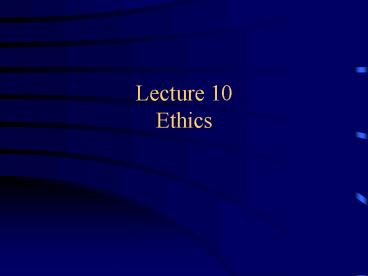Lecture 10 Ethics - PowerPoint PPT Presentation
1 / 17
Title:
Lecture 10 Ethics
Description:
But more than this also follow teaching of Christ love thy neighbour ... In 1770 he was appointed to the chair of logic and metaphysics at K ningsberg. ... – PowerPoint PPT presentation
Number of Views:32
Avg rating:3.0/5.0
Title: Lecture 10 Ethics
1
Lecture 10Ethics
2
Types of Ethics
3
Christian Ethics
- Based on Ten Commandments
- Apply regardless of consequences
- God says what is right and wrong
- Dos and Donts
- But more than this also follow teaching of
Christ love thy neighbour - If God does not exist then no morals?
4
Criticisms of Christian Ethics
- What is Gods will?
- The bible is open to interpretation. Take killing
in a war? - It assumes Gods existence
- Is god benevolent? What if God does not exist?
5
Immanuel Kant1724 -1804
German philosopher and founder of critical
philosophy. The son of a saddler, Kant was born
and educated in Knigsberg (Kaliningrad) in East
Prussia. After leaving the university he spent a
number of years in private tutoring, but taking
his master's degree in 1755, he settled to teach
a variety of subjects as Privatdozent. In 1770 he
was appointed to the chair of logic and
metaphysics at Kningsberg. It was after this
that he entered on his greatest, "critical"
period. His life was orderly to the point of
caricature he never left Kningsberg, and never
married
6
Kantian Ethics - Motives
- What are motives
- A moral action is one which is done out of duty
not out of gain for the person doing it. If one
gives money to charity out of a deep feeling of
compassion this may not be moral action. It must
be done as a duty. - The motive for the action is more important than
the action - All people can be moral
- We do not have complete control over our emotions
but we can be moral if we act to duty.
7
Kantian Ethics - Maxims
- Kant described the intentions behind an action as
a maxim - A maxim is the general principle underlying an
action.
8
The Good Samaritan what was the Maxim?
- Always help those in need if you expect you will
be rewarded for your troubles - Always help those in need when you experience a
feeling of compassion - Always help those in need because it is your duty
to do so - Which is moral according to Kant?
9
Kantian Ethics The Categorical Imperative
- Humans have absolute, unconditional duties
categorical duties. - Kant contrasted categorical duties with
hypothetical ones. - Hypothetical If you want to be respected tell
the truth. Categorical Tell the truth. - One basic categorical imperative Act only on
maxims which you can at the same time want to be
universal laws
10
The Categorical Imperative
- Universalizability
- Treat people as ends in themselves, never as a
means to an end.
11
Criticisms of Kantian Ethics
- It is empty
- It is a framework and does not tell people what
to do. This ignores the categorical imperative - It does not deal well with conflicts of duty
never lie , but protect your friends - Universalizable immoral acts
- Some say that immoral acts can become universal
but again this ignores the categorical imperative - Implausible aspects
- Dismisses emotions.
- Takes no account of consequences of actions
12
Consequentialism
- Judges actions by their consequences not the
intentions of those performing the action.
13
John Stuart Mill 1806 - 1873
English philosopher and Economist, and the most
influential liberal thinker of the 19th century.
As the son of James Mill, John was given an
intensive private education, in which he began
Greek at the age of three, and Latin (and six of
the Dialogues of Plato) at the age of eight (Mill
himself remarks that the Theaetetus might have
been a little much for him). As a teenager he was
immersed in his father's philosophical and
political interests until a nervous breakdown at
the age of 20 led to a re-evaluation, and
softening of his somewhat radical position.
Thereafter, influenced by Saint-Simon and others,
Mill maintained a more sophisticated appreciation
of the historical forces moulding peoples' ideas,
and a less cynical view of the forces of
reaction. From 1831 his friendship with the
married Harriet Taylor was central to Mill's
life in 1849 after the death of her husband they
married. Harriet Taylor died in 1858 in Avignon
the nature of her influence on Mill's thought is
interesting and complex
14
Utilitarianism
- Based on hedonism
- The ultimate aim of human activity is happiness.
- Good is what ever brings the most happiness.
- The right action is that brings about the most
happiness - Has to deal with probable effects
15
Criticisms of Utilitarianism
- Difficulties in calculation
- How do you measure happiness? Mill came up with
higher and lower pleasures - Problem cases
- It can justify many actions which might be
considered to be immoral.
16
Negative utilitarianism
- A moral action is one which produces the least
amount of unhappiness
17
Rule utilitarianism
- This combines utilitarianism with deontological
ethics - There are general rules which can then be judged
on the happiness that they produce - Very practical





























![[DOWNLOAD]⚡️PDF✔️ The Metaphysical Basis of Ethics: G.E. Moore and the Origins of Analytic Philo PowerPoint PPT Presentation](https://s3.amazonaws.com/images.powershow.com/10047944.th0.jpg?_=20240605045)
![[DOWNLOAD]⚡️PDF✔️ The Metaphysical Basis of Ethics: G.E. Moore and the Origins of Analytic Philo PowerPoint PPT Presentation](https://s3.amazonaws.com/images.powershow.com/10048553.th0.jpg?_=20240605127)
